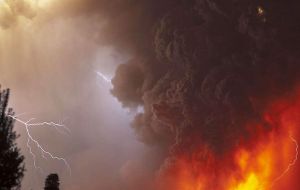MercoPress. South Atlantic News Agency
“Cork” of lava threatens new explosion at Puyehue volcano warns Chile
 The mighty Puyehue continues to spew ash and lava (Photo EFE)
The mighty Puyehue continues to spew ash and lava (Photo EFE) Chilean experts warned Wednesday that a “cork” of lava could lead to another explosion at the Puyehue volcano, which has caused major flight disruptions from Argentina to Australia.
Seismic activity has declined, with two tremors of a magnitude of around 2.5 recorded every hour on Tuesday, compared with several hundred of a magnitude of four or five in the hours preceding the initial June 4 eruption.
But Chile's National Service of Geology and Mining (SERNAGEOMIN), which monitors volcanic activity, said the volcano had to be kept on red alert because of the possibility of another explosion.
Geologists said a “cork” of lava, which emerged on Tuesday and was blocking even more lava from spewing forth, had the potential to create a huge build-up in pressure.
If this continues, “an explosive event remains possible because the path the lava is taking is obstructed, or because the eruption dynamic has changed,” said SERNAGEOMIN director Enrique Valdivieso.
Meantime the travel misery continued for many on Wednesday with Chile's national carrier LAN suspending flights to both Temuco and Valdivia in the south and delaying services on several other routes.
Several more southern Chilean cities, including Rininahue, Llifen, Futrono, Villarrica and Pucon, were hit Tuesday by a cascade of fine ash, according to SERNAGEOMIN.
And in Australia Wednesday, several thousand airline passengers continued to face numerous delays.
In Argentina Aerolíneas, Austral and Lan Argentina announced Wednesday morning that they had begun to re-schedule southbound domestic flights due to the clearing of weather conditions. A first flight took off from Ezeiza international airport in the morning to Ushuaia, however taking a different route along the Atlantic coast.
However inbound and outbound flight services are still suspended at the following airports: Bariloche, Chapelco, Trelew, Neuquén, Viedma, El Calafate, Río Grande, Comodoro Rivadavia, Esquel, Santa Rosa, San Rafael, Bahía Blanca, and Mar del Plata.
Lan Argentina informed that their flight service to and from Aeroparque, Ezeiza and Bahía Blanca, were all running as normal. Similarly flight operations between Aeroparque and Río Gallegos are running normal.
Meanwhile in southern Argentina's Patagonia, ranchers were becoming seriously concerned about up to 1.5 million sheep and other livestock now forced to graze on ash-covered pastures.




Top Comments
Disclaimer & comment rulesCommenting for this story is now closed.
If you have a Facebook account, become a fan and comment on our Facebook Page!